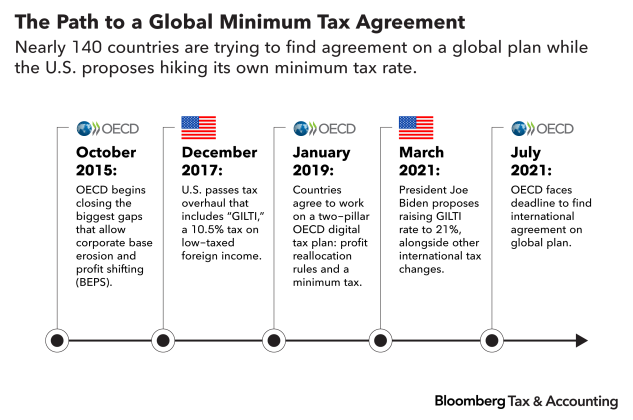Context
-
Recently, there seems to be a growing momentum around the world for a transformation of the global tax system. The U.S. Deputy Treasury Secretary anticipates strong support from the G7 industrial democracies for the US Administration’s proposed 15%-plus global minimum corporate tax.
About Global Minimum Corporate Tax
- The development of a ‘global minimum corporate tax rate’ – in essence, setting a minimum rate for corporations all over the world to pay regardless of which jurisdiction they are registered in is a welcome idea, exposited by the arguably most important decision-maker in the world economy.
- This is a move designed to tackle a worldwide phenomenon known as Base Erosion and Profit Shifting (BEPS), wherein large corporations register in low-tax jurisdictions to avoid paying higher rates of corporate tax prevalent in the countries they actually operate in.

Source: Bloomberg - A global minimum rate would ensure that companies would have to pay wherever they were registered, with revenues being apportioned according to the extent of their activity in the respective countries.
- Overall, it is estimated that corporate tax avoidance costs countries around the world $300 to $500 billion in lost revenues each year, not to mention the economist Gabriel Zucman’s estimate that, as of 2017, an accumulated $8.7 trillion of global wealth is stored in these low-tax jurisdictions (known to us more familiarly as tax havens).
- To address “the challenges posed by the enterprises who conduct their business through digital means and carry out activities in the country remotely”, the Indian government has the ‘Equalisation Levy’, introduced in 2016.
- Also, the IT Act has been amended to bring in the concept of “Significant Economic Presence” for establishing “business connection” in the case of non-residents in India.
- This announcement from secretary Yellen comes at a time of increasing international interest in the issue, with broad support from organisations like the G20, the OECD, and the UN FACTI Panel for a global minimum tax rate.
How would Global Minimum Corporate Tax work?
- The global minimum tax rate would apply to companies’ overseas profits.
- Therefore, if countries agree on a global minimum, governments could still set whatever local corporate tax rate they want.
- But if companies pay lower rates in a particular country, their home governments could “top-up” their taxes to the agreed minimum rate, eliminating the advantage of shifting profits to a tax haven.
- The US administration has said it wants to deny exemptions for taxes paid to countries that don’t agree to a minimum rate.
Back to basics
Base erosion and profit shifting (BEPS)
- It refers to corporate tax planning strategies used by multinationals to “shift” profits from higher-tax jurisdictions to lower-tax jurisdictions, thus “eroding” the “tax-base” of the higher-tax jurisdictions.
- The Organisation for Economic Co-operation and Development (OECD) define BEPS strategies as “exploiting gaps and mismatches in tax rules”.
- It thus “erodes” the “tax base” of the higher-tax jurisdictions.
- It is alleged that BEPS tools are associated mostly with American technology and life science multinationals.
- Working together within OECD/G20 Inclusive Framework on BEPS, over 135 countries and jurisdictions are collaborating on the implementation of 15 measures to tackle tax avoidance, improve the coherence of international tax rules and ensure a more transparent tax environment.
UN FACTI Panel
- The UN FACTI Panel (or the High-Level Panel on International Financial Accountability, Transparency and Integrity for Achieving the 2030 Agenda) is a document of particular import for developing countries, stressing the loss caused by tax avoidance on the ability of developing countries to finance developmental measures.
- It aims to improve the world’s chances of achieving sustainable development by making recommendations that both strengthen current efforts to combat illicit financial flows, and close remaining gaps in the international system.
- The FACTI Panel is supported by an independent secretariat, hosted by the United Nations Department of Economic and Social Affairs/Financing for Sustainable Development Office.
Economy Current Affairs for UPSC : Click Here
